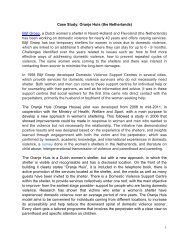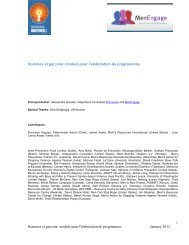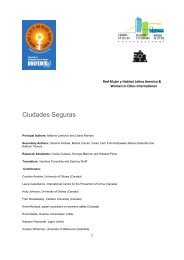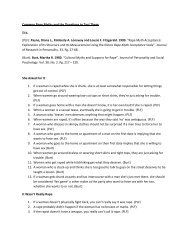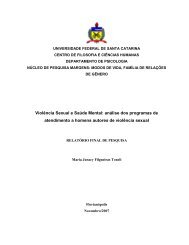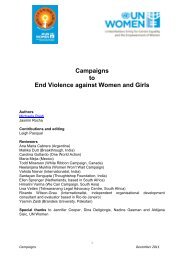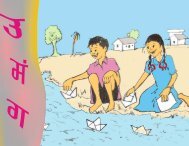Download PDF - Virtual Knowledge Centre to End Violence against ...
Download PDF - Virtual Knowledge Centre to End Violence against ...
Download PDF - Virtual Knowledge Centre to End Violence against ...
Create successful ePaper yourself
Turn your PDF publications into a flip-book with our unique Google optimized e-Paper software.
Examples of initiatives that have employed multiple strategies <strong>to</strong> target both the<br />
individual and his social context:<br />
� Sex<strong>to</strong> Sentido (Nicaragua)<br />
� Soul City Series 4 (South Africa)<br />
� Program H (Bolivia, Brazil, Colombia, Jamaica, Mexico, Peru, India, among other<br />
countries)<br />
� Raising Voices (Uganda)<br />
_____________________________________________________________________<br />
Ensure Adaptation for Different Settings<br />
If a programme from one setting is being implemented in another setting, it is important<br />
<strong>to</strong> also carry out formative research <strong>to</strong> ensure its appropriateness <strong>to</strong> the local culture<br />
and context, particularly since ideas of masculinity may vary from one setting <strong>to</strong><br />
another.<br />
CASE STUDY<br />
Formative Research Carried out by CORO for Literacy (India) <strong>to</strong> Adapt the Program<br />
H Initiative (Brazil)<br />
This case study describes how the Horizons Program; CORO for Literacy, an India-based NGO; and<br />
Institu<strong>to</strong> PROMUNDO, a Brazilian NGO, conducted operations research <strong>to</strong>:<br />
1) Examine the impact on young men of promoting gender equity as part of an HIV prevention<br />
programme in India; and<br />
2) Adapt the Program H manuals developed for use in Brazil <strong>to</strong> the context of India.<br />
Specifically, the research addressed the following questions:<br />
� How is masculinity unders<strong>to</strong>od and expressed by young men in India?<br />
� How can gender equitable norms and behaviours, including those related <strong>to</strong> violence and<br />
HIV/STI risk reduction, be promoted among young men?<br />
� Will this type of intervention (Program H) be feasible and acceptable in the Indian context?<br />
� What impact will the intervention have on attitudes <strong>to</strong>ward gender norms, and HIV and other<br />
risk behaviours?<br />
� How can change in attitudes <strong>to</strong>ward gender norms be measured?<br />
Formative research was conducted with young men in low-income communities in Mumbai, India, on the<br />
links between gender and masculinity, sexuality, and health risk, including:<br />
� 51 interviews with young men aged 16 <strong>to</strong> 24 years;<br />
� Four focus group discussions with NGO leaders, political and religious leaders, and young<br />
women from the same communities;<br />
� Intervention activities for young men were then developed / adapted; and<br />
� Peer leaders were trained <strong>to</strong> facilitate group education sessions.<br />
The feasibility and acceptability, as well as the impact of the intervention, were measured by:<br />
� Moni<strong>to</strong>ring attendance at the sessions and keeping track of the themes discussed during<br />
the activities;<br />
� Pre- and post-intervention surveys with the young men (n = 107 and n = 92, respectively) by<br />
an independent research team;<br />
� Qualitative interviews with a subset of young men after selected sessions (n = 16), with<br />
those who had dropped out of the intervention (n = 11), and with the intervention facilita<strong>to</strong>rs<br />
(n = four).<br />
� Observations of selected intervention activities also <strong>to</strong>ok place.<br />
In light of the formative research findings, the Program H curriculum was found suitable for the Indian<br />
context, and was adapted during a weeklong workshop, followed by two months of community<br />
consultations. The team adapted and pre-tested 20 group exercises based on participa<strong>to</strong>ry methods of<br />
learning with extensive use of role-plays, discussions, and debates.<br />
Men and Boys <strong>Knowledge</strong> Module January 2012 26<br />
,” Horizons Research Summary. New Delhi: Population Council.



